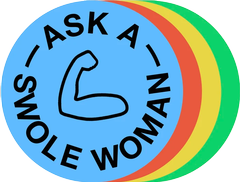Sick of clean eating, perfect gym outfits, and chiseled abs? A Swole Woman is here to help you be healthy, enjoy carbs, and get jacked.
Advertisement
I feel like I should be doing other stuff though? Should I be doing other stuff? Everyone else seems to be doing other stuff? People on instagram talk about muscle activation exercises, how do I know which of those to do and when? What is leg day? How much weight should I use for each set? What order should I do the lifts in? The one I do first is the one I'm most successful with, but then I lose track of whether the number I wrote down for one lift is from when I started with that lift, or when I did it last, and now I spend way too much time staring at the equipment and staring at my phone, wondering what the hell I should be doing. Do I need to just grow up and read a book? - TessaOk, we should talk about Instagram. In general, I think Instagram has been a really good thing for fitness. For a really long time, established media properties, especially ones whose businesses relied on marketing products that enforce rigid beauty standards (workouts, diet pills, and drinks, clothes for painfully thin people) were wholly in the clutches of those beauty standards. Social media, broadly speaking, gave a platform people who simply loved working out and loved their bodies could share that directly with others. There was, and still is, a lot of purity to it that the feedback loop of bigger media properties can’t touch. People with non-Victoria’s-Secret-model bodies who glossy magazines would never cover could finally get some airtime, like @mynameisjessamyn, @prettystrongbec, @jenbretty, or @maria_htee. Magazines may cover them now, now that they have painstakingly proved follower by follower and like by like there is actual interest in them and what they represent and have to say.
Advertisement
However, Instagram and other social media platforms have grown up quite a bit in the last few years. Influencers have their own sponsors and advertisers to answer to, which means they have principles they have to assert, aesthetics they have to maintain, in order to sell the products they need to. Part of this is making themselves eternally essential, like a personal trainer who never teaches you to work out and progress your training on your own, because if you could do things on your own, you wouldn’t need him. Part of that involves talking about the latest moves or trying the latest trends, which can be fine but is confusing to people who are trying to figure out where even begin.Health and fitness are ripe for marketing because it’s so easy to make people feel insecure about their health and bodies. People are very susceptible to personal guilt and insecurity, and there are few things they are less able to change than the fundamentals of what they look like. Even if we intellectually know this, it doesn’t stop us from feeling bad about it most of the time. This is also what leads us to think anything a conventionally attractive person does is what made them conventionally attractive. Someone who quite clearly had butt injections can post a video of herself doing side-lying leg lifts will still get all the people wishing they had a butt like hers also doing side-lying leg lifts. She doesn't even have to explain how a side-lying leg lift gives you a bigger butt, or claim that that's where her butt came from; we somehow manage to make those connections all on our own.
Advertisement
So this brings us to how easy it is to see lots of people doing lots of different things on social media platforms, claiming it has this or that effect: donkey kicks for a bigger butt! Spider crawls for defined abs! Doing a little digging on many of these people often reveals that they don’t really have the authority to claim these things, but there’s no one to really stop them. That’s the double-edged sword of social media: it rewards always having something new and exciting to say, even if what you’re saying has no real substance.Per the above, there’s a lot of real and useful information on Instagram, but it can be hard to separate (and a lot of times, the people with the most valuable things to say are not the ones with the most followers). I can say from experience, it actually takes a lot of time to even begin to learn who is worth listening to and who isn’t, and I’m really only just getting started. Even the actually helpful stuff is framed as “if you have [such and such particular problem],” but how do you know if you have that problem?So this is a vote in favor of trusted resources, of which there are many and I almost hesitate to name any because there’s no one true answer to “which program should I do?” But I can answer some questions: training programs are always written deliberately when it comes to number of sets, number of reps, and the order of exercises. When you pick a program, be it StrongLifts or reddit’s Beginner Routine or 5/3/1 for Beginners, you are meant to do them in the order they’re written, in the weekly rotation they are written.
Advertisement
You are also meant to stick with a program for long enough that it can pay off for you. Most knowledgeable coaches/critics, like Alan Thrall or Mike Israetel, say often that which very specific program you’re doing, especially if you’re a relative beginner, matters way less than being consistent, getting your rest, and making sure your form is good, and that throwing a bunch of random accessory exercises at yourself is not a lot more than a distraction. A lot of times, the target audiences for new trendy exercises are real gym rats who are bored after years and years of training and are looking to mix it up. This also isn't clear from social media video clips, but a lot of those accessory-type moves are tacked on at the end of a strength program mostly composed of bigger, fundamental movements (squat, bench, deadlift, row, overhead press), not an entire workout in and of themselves.That doesn’t sound like you! You sound like you want to get stronger and make progress, and maybe haven’t gotten that chance yet because you feel distracted or insecure about whether you’re doing the right things. You should feel reassured that a basic program like StrongLifts 5x5 IS a whole program, and you don’t need to mess with it. These programs are vaunted and popular because they do work. Even experienced lifters will return to them again and again if they are rebuilding after time off. if it feels like people maybe aren’t talking about these programs as much as the latest gluteus medius exercise, it’s because they feel like everyone already knows about basic stuff like 5x5, and they need something new to add.
Advertisement
All that said: These programs are designed to allow the people following them to get stronger fairly quickly, and in a straightforward beginner program, you add at least a couple of pounds to each of the major lifts (squat, bench, etc.) every session, or at least every week. if you are specifically worried about your body, such that you are getting hurt, or you’re doing your very best on form and consistency and recovery and you’re still not making progress, you may benefit from the help of a coach.Finding someone local and in person who is able to coach you in strength (“powerlifting coaches” with CSCS certifications) would be the best case scenario. More and more gyms that are focused on lifting (“powerlifting gym” or “strength training gym” in google-search language) are starting to offer intro tutorials or limited-run classes in lifting, where the goal is to teach you skills and advise you, versus simply making you run around for 45 minutes. But another benefit of the internet is that many such people now offer online coaching, where they can talk to you about what challenges you’re facing, watch videos of your form, and help you figure out how to achieve your goals. If you would benefit from activation exercises or particular targeted accessory movements, these are the people who would be able to tell you. There is a place for that stuff, and while I think we can be a little too apprehensive about trying stuff with our bodies, whichever activation and prehab/rehab-type moves we might see influencers do often come from someone's technical expertise.Should you or can you just read a book? For sure there are books: Strong Curves, New Rules of Lifting for Women, Scientific Principles of Strength Training, and Thinner Leaner Stronger are a few that I have enjoyed (even as some of the framing in these is, in some ways, a little problematic). Only you know whether reading a book or trying to work with a coach or take a class will work better for you. (I should note, a coach can tailor their advice to you, while a book may involve some educated guessing as to what your challenges are.) Whatever you do, definitely write down what you’re doing in the gym at each step, so you’re not trying to remember what you did last time and what would constitute “doing more than last time” (or, if it’s a bad day, what would constitute going easy on yourself and doing less).Just remember that you don’t need to be aiming to take over the world by building the strongest body of all time, or doing the most accessories, or trying all of the latest stuff; incremental progress at it relates to yourself, and yourself only, will give you plenty to do.Disclaimer: Casey Johnston is not a doctor, nutritionist, dietitian, personal trainer, physiotherapist, psychotherapist, doctor, or lawyer; she is simply someone who done a lot of, and read a lot about, lifting weights.
You can read past Ask A Swole Woman columns at The Hairpin and at SELF and follow A Swole Woman on Instagram. Got a question for her? Email swole.woman@vice.com .
You can read past Ask A Swole Woman columns at The Hairpin and at SELF and follow A Swole Woman on Instagram. Got a question for her? Email swole.woman@vice.com .

